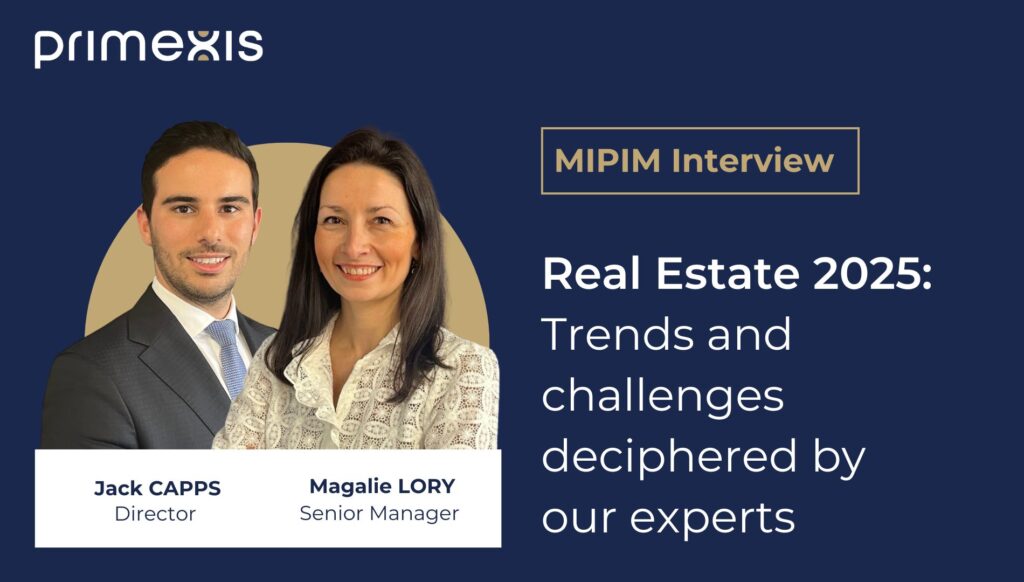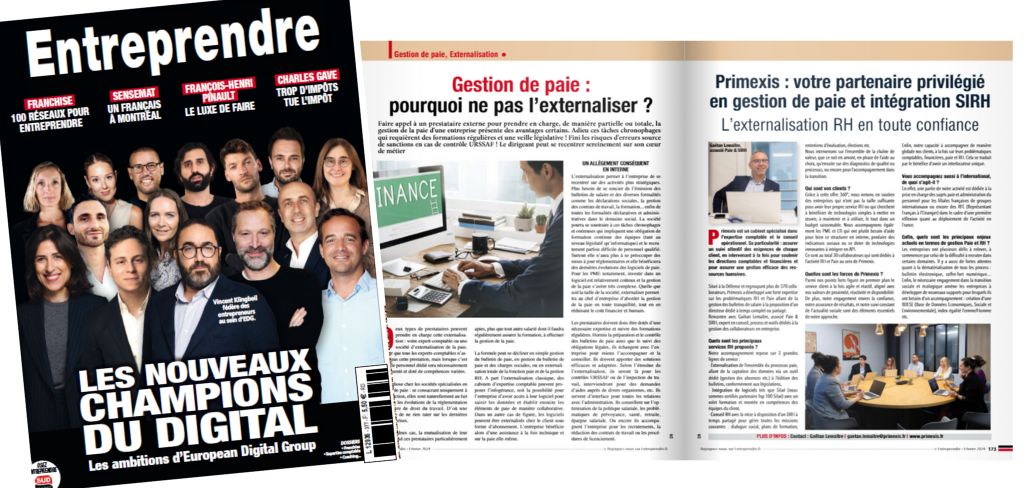MIPIM Interview
Real Estate 2025: Trends and challenges
deciphered by our experts

Against the background of transformation in the real estate market and between the revision of the CSRD and ESG challenges, the professionals in the sector have to adapt. Jack Capps and Magalie Lory from Primexis give us their analysis of trends and prospects for the upcoming year, live from MIPIM 2025 in Cannes, France.
From MIPIM 2025 in Cannes, we are looking at the outlook for the real estate market. After a complex year, will 2025 bounce back? What are the challenges related to sustainable development? What impact will the recent revisions of the CSRD have? To talk about this, we are pleased to welcome the experts from Primexis: Jack Capps, Director of the Real Estate department, and Magalie Lory, Senior Manager. To start, could you briefly introduce Primexis?
Jack Capps: Primexis is a financial consulting and specialized accounting firm. We are located in Paris La Défense, and our team is made up of about 400 employees working with major French accounts and subsidiaries of international groups. Our real estate department has around 50 specialists, complemented by a group of about 20 people dedicated to funds, private equity, hotels, and real estate. We help our clients with their financial and non-financial reporting, taxation, consolidation, fund evaluation, and transactions.
Magalie, this is your first time at this event. What are your expectations?
Magalie Lory: Absolutely, and I am delighted to be taking part. This event gives me the opportunity to meet our French and international clients as well as our partners: lawyers, notaries, and major players in the sector. This is the only opportunity to talk about the market trends and adapt our consulting assignments to an ever-changing sector.
The real estate market is going through a price correction phase. How are your clients reacting to this situation?
JC: This situation opened up acquisition opportunities for some of our clients with financing capacities. We assisted them with complex transactions, such as the acquisition of the O’Parinor shopping center by Sofidy and Klépierre or the purchase of a portfolio of retail properties under development. At the same time, other clients encountered difficulties due to rising interest rates and price correction causing them to sell some assets. We worked alongside them to structure these sales, as we did for a tower at La Défense or an office in the inner suburbs of Paris.
ML: In addition, several asset management companies took advantage of this situation to start opportunist real estate funds, in particular via FPCIs (Professional Capital Investment Funds). We assist them in determining their net asset values. These funds are diversified across different asset classes to limit risk, from healthcare real estate to residential, retail, and office assets.
Was 2024 a good year for Primexis?
JC: Actually, our real estate department recorded double-digit growth. This success is based on our clients’ confidence and our teams’ efforts. We won several tenders and assisted growing funds, particularly in the student and senior residence sectors, as well as with funds specializing in asset restructuring.
Office real estate is particularly affected, with record vacancy rates in the Paris region. How are your clients coping?
ML: In some sectors, vacancy rates are as high as 20%. However, this also creates opportunities. For example, we are working with Novaxia, which is focusing on urban recycling by transforming empty offices into housing while integrating sustainable development challenges. This approach responds both to the lack of available properties in heavily populated areas (zones tendues) and the need to optimize the use of existing spaces.
How do you assist your clients with ESG challenges?
JC: ESG criteria are now essential for all real estate players: investors, banks, and lessees. Our clients integrate them both to attract financing and to structure their investments. We help them understand and apply regulations and also to formalize their non-financial reporting, especially with the ISR (socially responsible investment) certification and SFDR classification. For that matter, many of our experts have obtained the CNCC’s (National Company of Statutory Auditors) sustainability visa this year to help our clients comply with CSRD.
On the subject of CSRD, do you think this European Commission bill is a step backwards?
JC: This omnibus bill doesn’t send a very positive message. However, it also needs to be looked at in a broader geopolitical context where the trend today is clearly towards deregulation. That said, CSRD reporting has not been left behind. This bill focuses on a gradual application with higher thresholds, while simplifying certain non-financial reporting obligations.
In your opinion, what do you think the real estate players’ reactions to this bill are?
I am convinced that the majority of real estate players remain committed. We have seen numerous funds, several mid-cap companies and SMEs, even small companies voluntarily choosing to continue working on and developing their sustainability reporting. This shows that there is still real investment in the field, even in the face of regulatory uncertainty.

Jack Capps
Primexis Director
Lastly, could you tell us about Primexis’ outlook for 2025?
ML: Overall, we have an optimistic outlook for this year. We are confident in our clients’ resilience, whether they’re French or international, and we know that they have the necessary resources to continue developing in France. However, it is clear that the current economic and geopolitical context calls for caution. Nevertheless, we remain positive and fully committed to new projects, in particular, in the emerging new sectors and investment funds.


